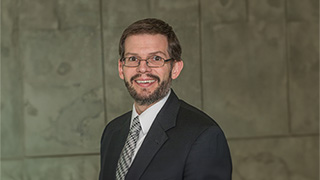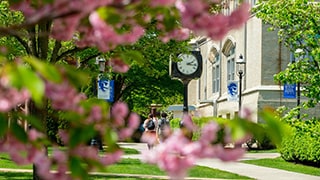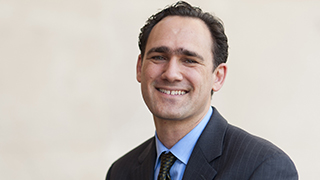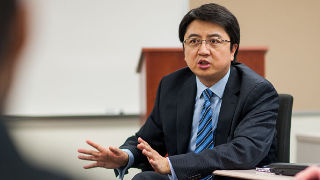Seton Hall University Hosts Virtual Reality Roadshow
Wednesday, March 26, 2025
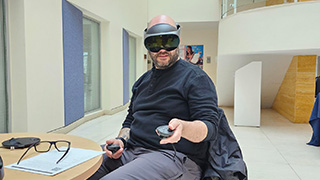
Gary Susalis exploring the virtual frontier.
The Trends in Ed Tech Committee of the Teaching, Learning, and Technology Roundtable, chaired by Christine Lhowe, associate professor of Art & Design, Department of Communication Media and Arts, and Renee M. Cicchino, director of Instructional Design & Training at TLTC, hosted a Virtual Reality (VR) Roadshow on March 24, 2025. The event offered faculty the opportunity to "try and fly" — an interactive experience designed to demonstrate the transformative potential of VR in education.
The event showcased cutting-edge VR applications, demonstrating how immersive technology can create realistic, hands-on learning experiences that overcome logistical, financial, or safety limitations. Various Seton Hall community members attended, including those from WSOU, College of Human Development, Culture, and Media (CHDC), College of Arts and Sciences and Continuing Education and Professional Studies to explore VR’s expanding role in modern education.
Jim Daly, professor in the Department of Educational Studies, shared his thoughts on the experience: "I enjoyed the VR experience. While I have used an Oculus, the possibilities of VR in education are intriguing. I appreciated the patience, knowledge and skill with which Scott Bergenfeld from the TLTC guided me through some current and future uses. Thoughtful uses of VR hold promise in engaging students with close-to-authentic experiences—strolling through Jerusalem, visiting battlefields, examining aquatic life, and gaining a better sense of geography. No text can offer the same immersive opportunity.”
Erik Hill, Ph.D., assistant professor in the Department of Biological Sciences, highlighted the advantages of VR in STEM education, "STEM classes involve a lot of tactile experiences, having the VR environment is an advantage for students to do things we might not be able to do because of time, scale, or conditions. In VR, we can interact with enzymes and small molecules in simulations. VR allows for interactions with pollinators in a simulated field without waiting for the weather to clear or enough animals to show up. We can simulate perfect conditions, or the imperfect ones without even leaving campus."
The event marked a significant step in showcasing how VR can revolutionize education. Faculty were able to witness firsthand how immersive technology can break traditional barriers and offer new avenues for learning.
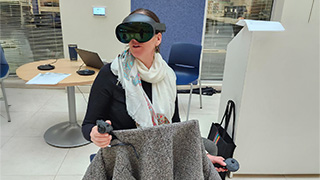
Mary Kate Naatus, Ph.D., immersed in VR innovation.
Mary Kate Naatus, Ph.D., assistant provost and dean of Continuing Education and Professional Studies, emphasized VR’s impact beyond the classroom, "Virtual Reality has the power to prepare students for immersive international experiences and real-world professional settings by simulating diverse cultural environments and realistic industry scenarios. In higher education, this technology can enhance global readiness and cross-cultural competence while offering hands-on practice in professional decision-making, helping students excel in an interconnected world."
Building on the momentum of the VR Roadshow, the Teaching, Learning, and Technology Center (TLTC) will host sessions on April 1, 2025, exploring how VR can be integrated into the curriculum. Faculty will examine two powerful VR applications—Notes on Blindness and Anne Frank House VR—to discuss their educational potential. The sessions will conclude with hands-on experiences featuring Meta Quest TV, YouTube VR, and FloatVR Relaxation and Focus apps, giving participants a firsthand look at VR’s capabilities. Register for the sessions here.
Categories: Science and Technology

